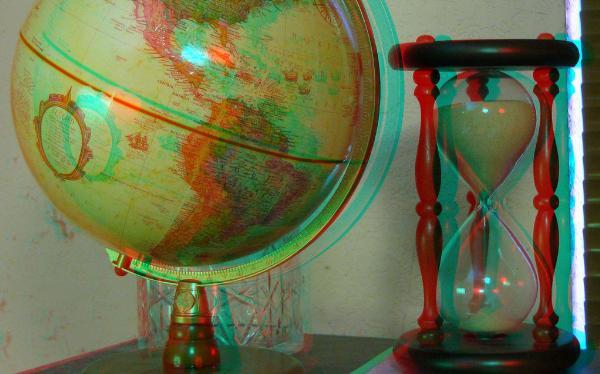In his latest book, Professor Nicholas Boyle argues that the character of the twenty-first century will be decided by an event that will take place at some point in the middle of this decade, as has been the case in previous centuries. But what will that event be? Professor Boyle looks at the crises and opportunities that are presenting themselves currently in Europe and beyond, and asks how we can see ‘a Christian meaning in the present moment of decision’.
In 1998, I published a book called, Who are We Now?, in which I took the view that the explosion of global trade and finance in the Reagan/Thatcher years and especially after the collapse of Communism, was a revival of the last great age of globalisation at the end of the 19th century. That view is now pretty orthodox. From about 1860 onwards there was a huge expansion of world trade and migration. That process of globalisation came to an abrupt end in 1914. It stuttered back to life in the 1920s, before shutting down again during the Fascist-Communist era, and it finally resumed properly in 1989.
But that raised a nasty question for me, which I set out to try to answer in June 2010 in a book called 2014, How to Survive the Next World Crisis. Full-throttle globalisation lasted 40 or 50 years in the late nineteenth century before hitting the buffers. Would the same process in the late twentieth century also end in tears? Would 2014 (or thereabouts) turn out to be a new 1914? Would there be a Great Event that would mark the twenty-first century in the way the effects of the Great War continued to be felt for the 75 years to 1989? It wasn’t encouraging that the year in which the credit crunch started was the centenary of the great stock-market slide of 1907 which, like the slide of 1932, was followed seven years later by war.
If a century has a character at all, it is going to be apparent what it is by the time it is twenty years old – just like a human individual. If it became apparent much later, in the fifties, say, it wouldn’t be the character of the whole century. The twentieth century was the century of World Wars – First, Second, and Cold. The nineteenth century was the age of Empires. In both cases the character of the century became visible in a decisive event in the middle of the second decade, and that event still influenced the lives of the grandchildren of those involved in it: in 1815, after the Battle of Waterloo, the Congress of Vienna set up a world system that lasted for ninety nine years, dominated by the British Empire, and with a careful balance of power in Europe.
Go further back and you find the same pattern. The eighteenth century was the Age of Enlightenment, which can be dated from 1715 when Louis XIV died and in Britain the Hanoverian dynasty began. The seventeenth century was a century of civil and religious wars, of which the most destructive, the Thirty Years War, began in 1618. 1517 saw the start of the Reformation, which overshadowed the entire sixteenth century.
But you can’t tell in advance whether the Great Event will be a disaster like 1914 or a creative act of peace-making like the Congress of Vienna. What we can say in our own situation, before our own Great Event has happened, is that big decisions will be taken during the next few years and they will be seen by posterity as manifesting the character of the twenty-first century. And there is no shortage of big issues that clearly have the potential to affect the lives of our children and grandchildren: climate change, dwindling energy resources, the shift of power from West to East.
The runaway financial globalisation of the last two decades has landed us in an economic crisis that is already morphing into a political crisis. In Europe the dire situation of the euro is raising questions about the future of the Union: either there has to be more political integration or the political project of European unification will start to fall apart. But the whole world, not just Europe, faces a similar question. The big decisions that are impending are decisions about how we cope with the stresses that the liberalisation of world markets has created.
Eighteen months after its original publication, as 2014 goes into paperback, in Europe the political barometer is set to ‘Change’, perhaps even to ‘Storm’, just as it is in the USA. The worldwide mismatch between financial and institutional integration, discussed in the second chapter of 2014, has had particularly damaging consequences in the European Union. The currency union can be saved only by some variant of a fiscal union, and no doubt at least some of the signatories to the Maastricht Treaty foresaw that their successors would one day stand at such a crossroads. But they can hardly have foreseen that the circumstances in which a decision had to be made would be so unpropitious that they might threaten the entire project of European unification.
However, if the political will to an ever-closer European union now seems in danger of being neutralized by nationalist and protectionist reactions to global economic change, for that too Maastricht is responsible. The decision in 1992 to pursue the establishment of a single currency rather than the reform and reinforcement of political institutions has left the Union with little hold over its people’s affections or their sense of identity. Whether the Accord which has been signed by the eurozone members and some of the other member states – but not Britain or Hungary – is sufficient to save the euro remains to be seen. It will probably be necessary to establish a European treasury with power to tax – the obvious tool being a tax on financial transactions in euros – and so with a revenue stream that would allow it to issue bonds in its own right. The European Central Bank would thus acquire the status of a sovereign lender of last resort. It is equally probable that Mr Cameron’s decision to opt out will mark the beginning of the decline of the City of London, as those within the central European core of states will look to Frankfurt to assume the role of eurozone bourse.
2014 will be like and unlike 1914. We have the same problem of how to manage a global system of trade and finance that is far bigger than any of the individual participants – too big to fail, but still capable of failing. And there are the same temptations to protectionism and nationalism that led to disaster in 1914 and again in the 1930s. Nevertheless the other name of crisis is still ‘opportunity’. It is still perfectly possible that the ultimate effects of the Great Events ahead of us will be benign. Even a break-up of the European currency union could lead to a resumption of the suspended process of political unification on a more realistic basis and with more durable results.
Grounds for hope also lie in the fact that there is vastly more international co-operation than there was a century ago. In 1900 there were half a dozen intergovernmental bodies on the planet; in 2000 there were over six thousand. The means do exist for relieving the pressures the economic system is putting on the world’s governments, provided the governments are willing to make use of them. But it is necessary to look deeper than such worldly hopes if we are to see a Christian meaning in the present moment of decision.
The great danger in trying to discern a meaningful, large-scale pattern in historical events is smugness. If in the pattern everything turns out all right in the end, it is all too easy to forget everything that is not the goal or a step on the road to it, to reduce all the non-participants and all the victims to – in the notorious words of a former British Chancellor of the Exchequer, contemplating what at the time were the worst unemployment figures in Europe – ‘a price worth paying’. The engine of globalisation has been running I believe at full throttle for about a century and a quarter now. To hundreds of millions it has brought a prosperity unimaginable in the late nineteenth century. To thousands of millions who would not have been conceived but for the spread of European and American medical technology in the generation of their parents and grandparents, it has given life itself.
But the price has been unimaginable, too – physical and cultural, economic and moral: perhaps 100 million killed in the course and aftermath of the two great wars in which the global market destroyed the old Empires; continuing vast numbers of casualties in the conflicts and genocides that have followed on the unravelling of the colonial and post-colonial political structures; untold further millions of victims of the great revolutions in Russia and China. Whole societies have been swept away and forms of life have become impossible – even for the wealthy of the planet the price of prosperity is more competition, harder work, more and more auditing and alienating control; or alternatively the despair of unemployment and dependency. For an appallingly high proportion of those whose life has been made possible by economic expansion, such life entails being abandoned by impoverished parents, orphaned by war or pandemic Aids, or being in significant danger of falling victim to famine or natural disasters made deadly by overcrowding.
And what of the potential costs of this great, possibly reckless gamble? Not only is it possible that we have imposed demands on our planetary environment, on earth and air, on energy and water that it is not or may not in future be able to meet. We have also created, as the inevitable counterpart of the productive capacities of our world economic system, a destructive potential which still, as a balance of terror, maintains a degree of order in our international political system. It is quite conceivable that all the apparent gains of the vast economic expansion – all those lives, all that wealth – will literally evaporate in mushroom clouds of radioactive smoke.
But to think in these terms of profit and loss, to tot up numbers with many zeroes on the end, is to accept the accounting mentality on which the global market relies, the interchangeability, through the countable units of monetary exchange, of all the products of human labour, of lives, and of identities. The highest cost is the moral cost, the coming existence of a mentality, a way of engaging with the world, which makes lives countable and calculates that so much suffering of starving children and blighted minds is a cost worth paying for so much systemic efficiency gain. Even to ask the question ‘Is it worth it?’ – whatever the answer returned to it – is as great an outrage as any that the question weighs in the assayer’s balance.
When presidents can do as popes once did and declare that unfriendly regimes and princes are to be deposed and murdered, the claim to temporal authority for the gospel is not an anachronism. We seriously believe that the good news of Jesus Christ is to be proclaimed everywhere and at all times, to heads of state and to intergovernmental conferences as well as in the parish church and in the confessional. We believe moreover that it is good news for the whole world, not just for all individual souls, but for all the forms and levels of human interaction which make up this life which Christ has redeemed in order that we should have it more abundantly. Even the furious raging of the nations can be calmed and brought closer to God.
‘Go ye and teach all nations’ is also a command to learn from all nations in order to teach them, and the universal church should see it as part of its mission to confront narrow thinking and narrow sensibilities, with the witness of all those it has taught and is teaching and all the eras in which it has been active. In our midst are those who are the voices of Europe, Africa, and Latin America, of the world’s poor and sick and suffering, of the future and the past, of the Middle Ages, Ancient Rome and yet even more ancient Israel, of moral and spiritual and intellectual and artistic experience in innumerable different contexts. That surely is the spirit in which we should pray that marvellous chant that accompanies the fixing of the incense grains in the Paschal Candle:
Christ yesterday and today
The Beginning and the End
The Alpha and Omega
His are the times and ages:
To Him be glory and dominion
Through all eternity. Amen.
Nicholas Boyle is Schröder Professor of German at the University of Cambridge and a fellow of Magdalene College. His latest book, 2014, How to Survive the Next World Crisis is published by Continuum and is now available in paperback.
![]() 2014, How to Survive the Next World Crisis by Nicholas Boyle
2014, How to Survive the Next World Crisis by Nicholas Boyle






